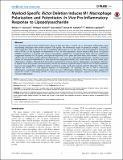Myeloid-Specific Rictor Deletion Induces M1 Macrophage Polarization and Potentiates In Vivo Pro-Inflammatory Response to Lipopolysaccharide
Author(s)
Festuccia, William T.; Pouliot, Philippe; Bakan, Inan; Sabatini, David M.; Laplante, Mathieu; Sabatini, David M.; ... Show more Show less
DownloadFestuccia-2014-Myeloid-specific Ric.pdf (3.164Mb)
PUBLISHER_CC
Publisher with Creative Commons License
Creative Commons Attribution
Terms of use
Metadata
Show full item recordAbstract
The phosphoinositide-3-kinase (PI3K)/protein kinase B (Akt) axis plays a central role in attenuating inflammation upon macrophage stimulation with toll-like receptor (TLR) ligands. The mechanistic target of rapamycin complex 2 (mTORC2) relays signal from PI3K to Akt but its role in modulating inflammation in vivo has never been investigated. To evaluate the role of mTORC2 in the regulation of inflammation in vivo, we have generated a mouse model lacking Rictor, an essential mTORC2 component, in myeloid cells. Primary macrophages isolated from myeloid-specific Rictor null mice exhibited an exaggerated response to TLRs ligands, and expressed high levels of M1 genes and lower levels of M2 markers. To determine whether the loss of Rictor similarly affected inflammation in vivo, mice were either fed a high fat diet, a situation promoting chronic but low-grade inflammation, or were injected with lipopolysaccharide (LPS), which mimics an acute, severe septic inflammatory condition. Although high fat feeding contributed to promote obesity, inflammation, macrophage infiltration in adipose tissue and systemic insulin resistance, we did not observe a significant impact of Rictor loss on these parameters. However, mice lacking Rictor exhibited a higher sensitivity to sceptic shock when injected with LPS. Altogether, these results indicate that mTORC2 is a key negative regulator of macrophages TLR signalling and that its role in modulating inflammation is particularly important in the context of severe inflammatory challenges. These observations suggest that approaches aimed at modulating mTORC2 activity may represent a possible therapeutic approach for diseases linked to excessive inflammation.
Date issued
2014-04Department
Whitehead Institute for Biomedical ResearchJournal
PLoS ONE
Publisher
Public Library of Science
Citation
Festuccia, William T., Philippe Pouliot, Inan Bakan, David M. Sabatini, and Mathieu Laplante. “Myeloid-Specific Rictor Deletion Induces M1 Macrophage Polarization and Potentiates In Vivo Pro-Inflammatory Response to Lipopolysaccharide.” Edited by Liwu Li. PLoS ONE 9, no. 4 (April 16, 2014): e95432.
Version: Final published version
ISSN
1932-6203